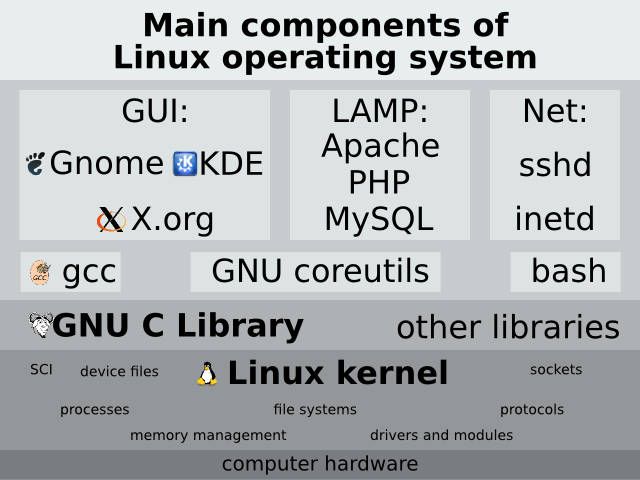What makes a Linux distribution?
Personally, I believe these are the qualities that define a Linux distribution:
- Philosophy
- Initialization system
- Package Repositories
- Package Manager
- Community/Maintainers
- Core utilities
Three of these qualities make up the guts of a Linux distribution, these are the Init system, package manager, and the core utils. These fundamentally change the way the system operates. For example, a Debian system operates differently from an Artix system, because they differ in their package manager and their init system. The core utils between these two systems remain the same however, the GNU Coreutils. However, Alpine uses Runit, its own package manager and the Busybox utils, which makes it a Linux distro, but not a GNU/Linux distro
The most interesting part of what defines a distribution (In my opinion), is the philosophy behind the project (And the maintainers). The philosophy decides where the distro goes, and how it operates. Even if a distro uses the same package manager, init and utils, the philosophy of the project can change how it functions for the end user. An example of this is Manjaro and Arch; both Manjaro and Arch have Systemd, pacman and the GNU Coreutils. What makes Arch different from Manjaro is that Manjaro does not follow the same philosophy as Arch. Arch follows "Keep it Simple, Stupid", while Manjaros philosophy is rooted in providing an easy experience to new users.
So, what doesn't define a distribution?
- Desktop Environment
- The Kernel/Kernel version
- Windowing System
Why do I believe this?
Both the Desktop Environment and Windowing system cannot define a Distro, unless the DE is unique to the distribution, ex: ElementaryOS. Even then, you can almost always find a way to use a unique DE on a distro it wasn't made for. This is because the DE is not a part of the guts of a Linux system, neither is the Windowing system. A distro is not defined by if it uses Wayland or Xorg, the reason why I believe this is because of most distros that have Wayland support still support Xorg at the same time, and that it is also not located in the guts of a Linux System. Xorg/Wayland and the DE both slot into a distribution, in a way that Coreutils can't.

